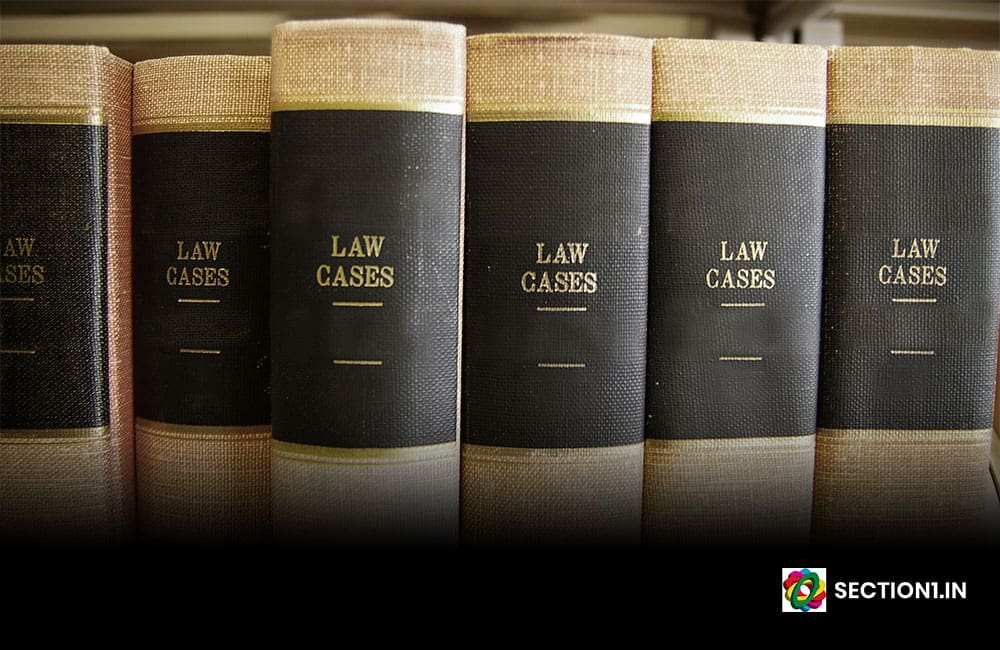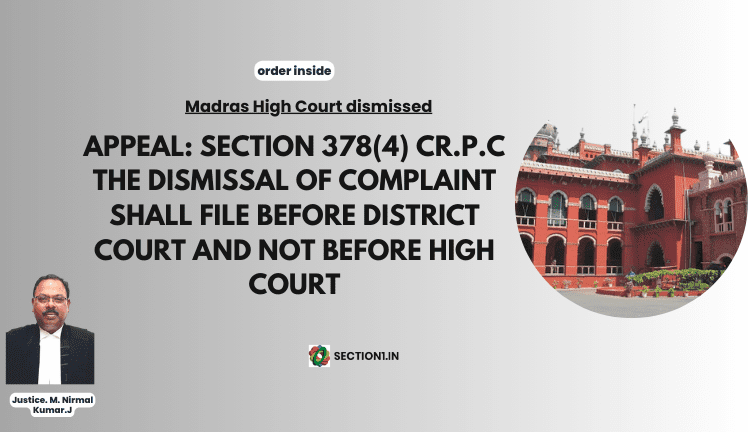4. The learned counsel for Respondent No. 2 sought to justify the impugned orders by relying on the following excerpt from this Court’s decision in Upkar Singh v. Ved Prakash & ors., (2004) 13 SCC 292, which clarified the import of its previous holding in T.T. Antony v. State of Kerala, (2001) 6 SCC 181:
“23. Be that as it may, if the law laid down by this Court in T.T. Antony case [(2001) 6 SCC 181: 2001 SCC (Cri) 1048] is to be accepted as holding that a second complaint in regard to the same incident filed as a counter complaint is prohibited under the Code then, in our opinion, such conclusion would lead to serious consequences. This will be clear from the hypothetical example given hereinbelow i.e. if in regard to a crime committed by the real accused he takes the first opportunity to lodge a false complaint and the same is registered by the jurisdictional police then the aggrieved victim of such crime will be precluded from lodging a complaint giving his version of the incident in question, consequently he will be deprived of his legitimated right to bring the real accused to book. This cannot be the purport of the Code.”
Therefore, Upkar Singh clarified that this Court’s previous decision in T.T. Anthony will not bar the filing of a second complaint with respect to the same incident, if such second complaint is filed as a countercomplaint by the other party. We are in agreement with the aforementioned construction of T.T. Anthony. However, we fail to see how this position of law comes to Respondent No.2’s rescue. The question posed in the present case for consideration before us is wholly different, and concerns the validity of the private complaint filed by Respondent No. 2, after an earlier information filed as NCR No. 158/2012 – both of which were filed by the same party, against the same accused, and in relation to the same incident that too after the charge sheet was filed in case arising out of NCR No. 160/12 in Crime No. 283/2017 after taking due permission of Magistrate. The aforementioned portion of Upkar Singh relied on by Respondent No. 2, thus, does not benefit his case.
5. Indeed, a closer look at the decision in Upkar Singh takes us to the contrary conclusion. In regard to the question of material improvements made in a subsequent private complaint by the same complainant against the same accused with regard to the same incident, it may be useful to refer to the following excerpt from Upkar Singh, which further clarifies the holding in T.T. Antony:
“17…In our opinion, this Court in that case only held that any further complaint by the same complainant or others against the same accused, subsequent to the registration of a case, is prohibited under the Code because an investigation in this regard would have already started and further complaint against the same accused will amount to an improvement on the facts mentioned in the original complaint, hence will be prohibited under Section 162 of the Code.”
(Emphasis supplied)
It is the aforementioned part of the holding in Upkar Singh that bears directly and strongly upon the present case. This Court in Upkar Singh has clearly stated that any further complaint by the same complainant against the same accused, after the case has already been registered, will be deemed to be an improvement from the original complaint. Though Upkar Singh was rendered in the context of a case involving cognizable offences, the same principle would also apply where a person gives information of a non cognizable offence and subsequently lodges a private complaint with respect to the same offence against the same accused person. Even in a non cognizable case, the police officer after the order of the Magistrate, is empowered to investigate the offence in the same manner as a cognizable case, except the power to arrest without a warrant. Therefore, the complainant cannot subject the accused to a double whammy of investigation by the police and inquiry before the Magistrate.
We are cognizant of the fact that in the present case, no investigation had begun pursuant to NCR No. 158/2012 filed by the Respondent No. 2 for a certain period. However, the overall concern expressed by this Court in Upkar Singh, about the misuse of successive complaints by the same party, where the second complaint is clearly propped up to materially improve on the earlier one, resonates with us. We regret to say that the same thing which this Court had categorically prohibited in Upkar Singh has happened in the present case.
6. The grave implications of allowing such misuse may be understood better in light of the following exposition by this Court in Amitbhai Anilchandra Shah v. CBI & anr., (2013) 6 SCC 348:
“37. This Court has consistently laid down the law on the issue interpreting the Code, that a second FIR in respect of an offence or different offences committed in the course of the same transaction is not only impermissible but it violates Article 21 of the Constitution. In T.T. Antony [(2001) 6 SCC 181 : 2001 SCC (Cri) 1048] , this Court has categorically held that registration of second FIR (which is not a cross case) is violative of Article 21 of the Constitution…”
(Emphasis supplied).
Article 21 of the Constitution guarantees that the right to life and liberty shall not be taken away except by due process of law. Permitting multiple complaints by the same party in respect of the same incident, whether it involves a cognizable or private complaint offence, will lead to the accused being entangled in numerous criminal proceedings. As such, he would be forced to keep surrendering his liberty and precious time before the police and the Courts, as and when required in each case. As this Court has held in Amitbhai Anilchandra Shah (supra), such an absurd and mischievous interpretation of the provisions of the CrPC will not stand the test of constitutional scrutiny, and therefore cannot be adopted by us.
7. The implications of such successive FIRs on an individual’s rights under Article 21 of the Constitution has been elaborated further in T.T. Antony (supra):
“27. A just balance between the fundamental rights of the citizens under Articles 19 and 21 of the Constitution and the expansive power of the police to investigate a cognizable offence has to be struck by the court. There cannot be any controversy that subsection (8) of Section 173 CrPC empowers the police to make further investigation, obtain further evidence (both oral and documentary) and forward a further report or reports to the Magistrate. In Narang case [Ram Lal Narang v. State (Delhi Admn.), (1979) 2 SCC 322 : 1979 SCC (Cri) 479] it was, however, observed that it would be appropriate to conduct further investigation with the permission of the court. However, the sweeping power of investigation does not warrant subjecting a citizen each time to fresh investigation by the police in respect of the same incident, giving rise to one or more cognizable offences, consequent upon filing of successive FIRs whether before or after filing the final report under Section 173(2) CrPC…”
(Emphasis supplied).
Thus, it is incumbent upon this Court to preserve this delicate balance between the power to investigate offences under the CrPC, and the fundamental right of the individual to be free from frivolous and repetitive criminal prosecutions forced upon him by the might of the State. If the Respondent No. 2 was aggrieved by lack of speedy investigation in the earlier case filed by him, the appropriate remedy would have been to apply to the Magistrate under Section 155(2), CrPC for directions to the police in this regard. Filing a private complaint without any prelude, after a gap of six years from the date of giving information to the police, smacks of mala fide on the part of Respondent No. 2.
12. Immediately after the criminal justice system is set in motion, its course is almost entirely dependent on the judicial application of mind by the Magistrate. When a police complaint is filed on the commission of a cognizable offence under Section 154 CrPC, the Magistrate decides if the charge against the accused person is made out before the trial begins. Separate procedure is prescribed if the complaint under Section 200 CrPC is filed. The aforesaid provisions make it abundantly clear that the Magistrate carries the stream of criminal proceeding forward after it is set in motion by the informant/complainant. Consequently, and automatically, the Magistrate also carries the responsibility for ensuring this stream does not carry forward in cases where it should not.
DUTY OF MAGISTRATE & TRIAL JUDGES AGAINST INJUSTICE:
18. As aforesaid, the trial courts and the Magistrates have an important role in curbing this injustice. They are the first lines of defence for both the integrity of the criminal justice system, and the harassed and distraught litigant. We are of the considered opinion that the trial courts have the power to not merely decide on acquittal or conviction of the accused person after the trial, but also the duty to nip frivolous litigations int eh bud even before they reach the stage of trial by discharging the accused in fit cases. This would not only save judicial time that comes at the cost of public money, but would also protect the right to liberty that every person is entitled to under Article 21 of the Constitution. In this context, the trial judges have as mush, if not more, responsibility in safeguarding the fundamental rights of the citizens of India as the highest court of this land.
PARTY: Krishna Lal Chawla & Ors.vs State Of U.P. & Anr – Criminal Appeal No. 283 Of 2021 – 08 March 2021.
Source: Download
URL:
Files : Download






